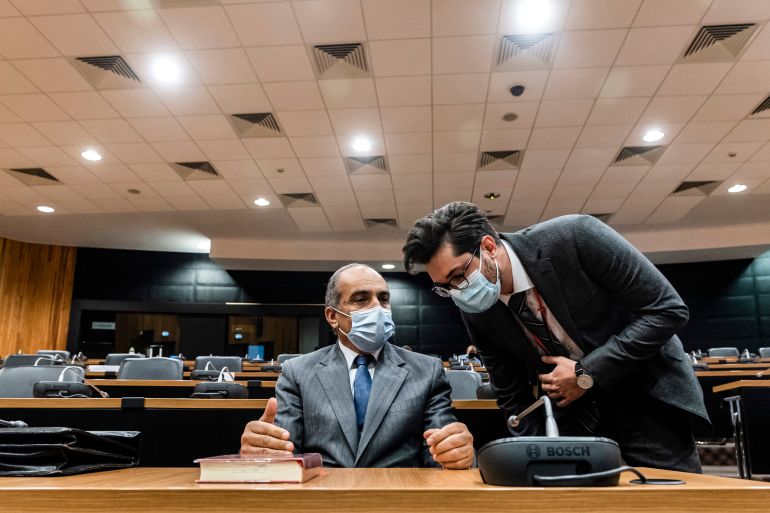Suspects to face trial in October for Cypriot passport scandal
The defendants, including former president of the Cypriot parliament, were exposed by Al Jazeera’s Investigative Unit.

The former president of the Cypriot parliament, Demetris Syllouris, and three others will face a criminal trial next month over a “cash-for-passports” scandal exposed by Al Jazeera’s Investigative Unit, a court has ruled.
The four, who appeared on Monday at the district court in the capital, Nicosia, face five corruption charges, including conspiracy to defraud the state and untoward influence over public officials. The trial date at the criminal court was set for October 26.
Keep reading
list of 4 itemsEU takes legal action against Cyprus, Malta over passport schemes
EU Parliament highly critical of golden passport schemes
Cypriot parliament speaker quits after passport scheme scandal
Besides Syllouris, the other three defendants are Christakis Giovanis, a former member of parliament and property developer for the Giovani Group; Antonis Antoniou, the Giovani Group’s executive director; and lawyer Andreas Pittadjis.
They deny any wrongdoing.
Syllouris’ lawyer Chris Triantafyllides asked the court to note the defence argument that there is a conflict of interest with charges filed by the Attorney-General George Savvides and his deputy Savvas Angelides, who were government ministers during the passport scandal
At the end of the 25-minute hearing, Syllouris, Giovanis and Antoniou were released on a 50,000-euro ($50,600) bail each. Pittadjis’s bail was set at 30,000 euros ($30,400), according to the Cyprus News Agency.
The charges followed Al Jazeera’s undercover investigation and the findings of an official inquiry prompted by the revelations, Cyprus authorities said.
Cyprus Investment Programme
The “golden passports” scandal was exposed in The Cyprus Papers Undercover, an Al Jazeera investigation released in October 2020.
In the documentary, all four men told an undercover reporter posing as the representative of a fictitious Chinese criminal that they were willing to help him obtain a Cypriot passport and become a citizen of the European Union – for a price.
They said they would help him acquire a passport through the Cyprus Investment Programme. Under the scheme, passports could be issued for a minimum 2.15 million euros ($2.5m at the time) investment.
However, convicted criminals were officially barred from applying, which would have disqualified the fictitious Chinese client.
Syllouris, then president of the Cypriot parliament, told the undercover reporters that their criminal boss would have his “full support”.
He said: “You can tell him that he will have, without mentioning my name or anybody else’s, full support from Cyprus. At any level – political, economic, social, everything.”
Asked if the criminal applicant would receive a passport, he said: “I cannot say 100 percent but I say 99 percent.”
Pittadjis said the client’s name could be changed on the passport, giving him a completely new identity, and making his criminal record undetectable.
This would allow a criminal to move money and travel through the EU without raising alarm.
When the reporters asked Pittadjis if he had previously changed a client’s name for a passport, he replied, laughing: “Of course, this is Cyprus!”
Giovanis said he would do everything he could to get a passport for the Chinese criminal. “It’s not easy. But I can promise, we shall do the best. And I believe we have the experience,” he said.
Antoniou said the Chinese criminal should invest up to 20 million euros ($20.2m) in Cyprus to benefit from “more favourable” terms. “You can ‘skip the waiting list’, as we say,” he said.
The documentary sent shock waves through the Mediterranean island. Within days of its release, the passport scheme was scrapped, Syllouris and Giovanis resigned, and the EU, Cypriot government and police launched investigations.
Thousands protested against corruption outside the parliament building in Nicosia.
EU passports are prized by many from outside the bloc, including Asia, the Middle East and Africa, and from countries such as Russia and Ukraine.
A Cypriot passport gives the holder the right to live, work and travel in the 27 EU member states and to enjoy visa-free access to more than 170 countries.
The Cyprus Papers
Before The Cyprus Papers Undercover was broadcast, the Investigative Unit released The Cyprus Papers, a trove of more than 2,000 leaked applications for the Cypriot passport programme.
The documents showed that between 2017 and 2019, Cyprus had approved passports for more than 30 people who were under criminal investigation, international sanctions or serving prison sentences.
A further 40 applicants held sensitive political or state positions, which meant they were considered a serious risk for bribery or money laundering under EU guidelines.
A 2021 Cyprus inquiry into the citizenship scheme found that 53 percent of the 6,779 citizenships granted between 2007 and 2020 – the vast majority of them to Russians – were unlawful.
The Cyprus exposé was part of a wider investigation that showed how a wealthy criminal could buy an English football club and use it to launder the proceeds of crime, helped by “enablers” who could hide his wealth and change his identity – with a new passport.
The undercover reporters were led to Cyprus by Keith Hunter, a private investigator and former Scotland Yard detective, who said he had contacts on the island who could help the criminal client obtain an EU passport.
The Investigative Unit’s documentary The Men Who Sell Football was released in August 2021 and picked up a string of United Kingdom and international awards and a BAFTA nomination in 2022. The Cyprus Papers Undercover was nominated for a BAFTA the previous year.